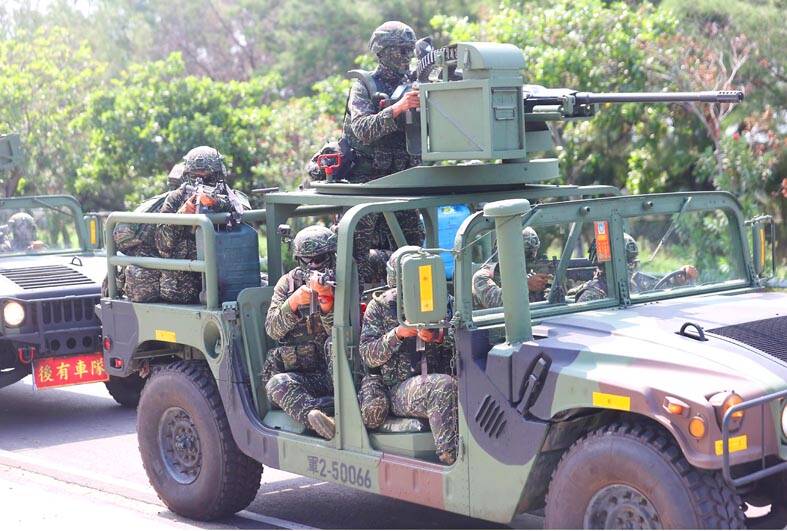The military yesterday held a series of air defense drills, including an evacuation and relocation of the air force’s Taipei command headquarters, on the second day of the live-fire phase of the annual Han Kuang exercises.
Due to Typhoon Doksuri, the scale of warplane deployments and air raid drills has been adjusted, military personnel familiar with the exercises said.
The primary purpose of the exercises was to test cross-branch air defense capabilities, several unnamed military sources said.

Photo: CNA
The joint operation saw the air force and navy deploy truck-mounted anti-air missile defense systems, including the Hsiung Feng (“Brave Wind”), Patriot PAC-2 and Tien Kung (“Sky Bow”), to conduct anti-aircraft and ballistic missile drills nationwide, the sources said.
The air force yesterday morning also completed a round of exercises simulating the relocation of the Joint Air Operations Command Center from Toad Mountain (蟾蜍山) in Taipei in the event of an attack, the sources said.
To ensure there would be no interruption in the chain of command in terms of air defense, military personnel stationed at Toad Mountain, commonly known as “the nerve center of Taiwan’s air force,” were relocated to an undisclosed alternative location to continue carrying out their mission, the sources added.
The military has at least three alternative command center locations in northern, southern and eastern Taiwan, they said.
The military yesterday also simulated the defense of critical infrastructure in cooperation with local police forces, firefighters and the Coast Guard Administration.
Meanwhile, the army’s attention was focused on a temporary coastal fortification system near a northern port that could be critical in repelling a Chinese attack.
Part of a response to a simulated invasion by China’s military, the 150m-long trench near the Port of Taipei in New Taipei City’s Bali District (八里) was built by reservists from the army’s 109th Infantry Brigade with help from civilian contractors, a military spokesperson said at the site.
This year’s trench system was significantly larger than the 100m-long trench system built a year ago for the Han Kuang exercises in Bali, the spokesperson said.
Similar to last year, it is located under a section of the elevated Provincial Highway 61 to take advantage of a forest surrounding the Port of Taipei.
The forest and the elevated expressway make the defensive stronghold less likely to be detected, giving infantry positioned inside the trench system a better chance of eliminating invading enemy forces using anti-armor weapons, the spokesperson said.
The location also has strategic significance, serving as a key defensive position for fending off a potential People’s Liberation Army invasion of Taiwan by sea, the spokesperson added.
Defending the area near the mouth of the Tamsui River has always been a priority for the military because if enemy forces were to take it, they could easily advance into Taipei and important political and economic facilities.
The trenches are big enough to be stocked with ammunition and supplies, artillery, rockets, machine guns and rifles, but because this year’s fortification is bigger, it can also house M60A3 battle tanks, providing more offensive power with which to deter or repel an enemy invasion.
The live-fire component of this year’s Han Kuang military exercises began on Monday with the focus of the first day testing the military’s preservation and maintenance of combat capabilities in the event of a full-scale Chinese invasion.
This year’s tabletop exercises were staged in May.

‘DENIAL DEFENSE’: The US would increase its military presence with uncrewed ships, and submarines, while boosting defense in the Indo-Pacific, a Pete Hegseth memo said The US is reorienting its military strategy to focus primarily on deterring a potential Chinese invasion of Taiwan, a memo signed by US Secretary of Defense Pete Hegseth showed. The memo also called on Taiwan to increase its defense spending. The document, known as the “Interim National Defense Strategic Guidance,” was distributed this month and detailed the national defense plans of US President Donald Trump’s administration, an article in the Washington Post said on Saturday. It outlines how the US can prepare for a potential war with China and defend itself from threats in the “near abroad,” including Greenland and the Panama

A wild live dugong was found in Taiwan for the first time in 88 years, after it was accidentally caught by a fisher’s net on Tuesday in Yilan County’s Fenniaolin (粉鳥林). This is the first sighting of the species in Taiwan since 1937, having already been considered “extinct” in the country and considered as “vulnerable” by the International Union for Conservation of Nature. A fisher surnamed Chen (陳) went to Fenniaolin to collect the fish in his netting, but instead caught a 3m long, 500kg dugong. The fisher released the animal back into the wild, not realizing it was an endangered species at

The High Prosecutors’ Office yesterday withdrew an appeal against the acquittal of a former bank manager 22 years after his death, marking Taiwan’s first instance of prosecutors rendering posthumous justice to a wrongfully convicted defendant. Chu Ching-en (諸慶恩) — formerly a manager at the Taipei branch of BNP Paribas — was in 1999 accused by Weng Mao-chung (翁茂鍾), then-president of Chia Her Industrial Co, of forging a request for a fixed deposit of US$10 million by I-Hwa Industrial Co, a subsidiary of Chia Her, which was used as collateral. Chu was ruled not guilty in the first trial, but was found guilty

The Chinese Nationalist Party (KMT) is maintaining close ties with Beijing, the Democratic Progressive Party (DPP) said yesterday, hours after a new round of Chinese military drills in the Taiwan Strait began. Political parties in a democracy have a responsibility to be loyal to the nation and defend its sovereignty, DPP spokesman Justin Wu (吳崢) told a news conference in Taipei. His comments came hours after Beijing announced via Chinese state media that the Chinese People’s Liberation Army’s Eastern Theater Command was holding large-scale drills simulating a multi-pronged attack on Taiwan. Contrary to the KMT’s claims that it is staunchly anti-communist, KMT Deputy